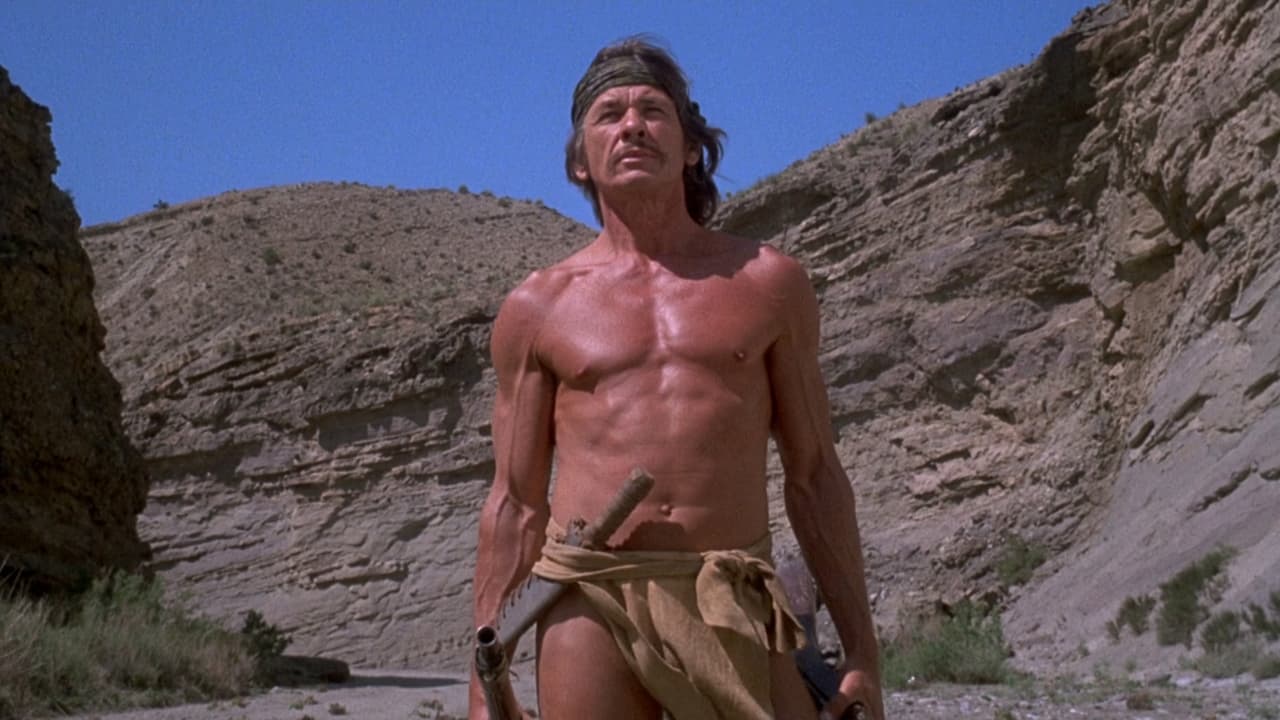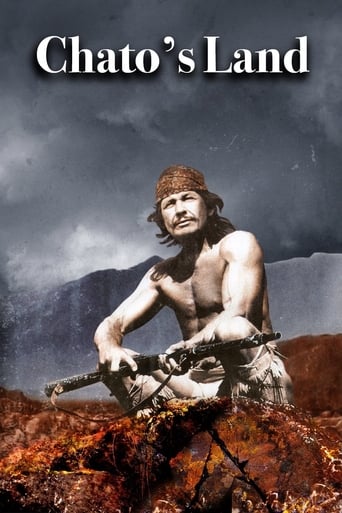

This film would not be made today because it would be considered politically incorrect. I would not normally watch a western like this but because I was at a relatives house, it was his TV so I watched. From the first scene of Charles Bronson quietly standing in a bar having a drink, to the end scene, I could tell this was not your ordinary western. I would call this a psychological exercise that turns morality and motivations of men on its head in the period after the civil war in the old west. With the simple back drop of the barren land of the old west ( which was really shot in Spain) Chato's land becomes one of the main characters of the film. The actors in the film are the heavy weights of old westerns who did an excellent job portraying their characters. Chato led these men into his land and basically let this posse of men battle themselves. It seems that the basest of natures resides in a small place in men's hearts and here we see that nature come to the forefront as they hunt Chato in order to "string him up" for shooting a sheriff in self defense. Just who is the bad guy and who is the good guy is questioned in this film. The fight between good and evil is challenged in this film. I would highly recommend this film. Be prepared to stick it out and look at the film as a study in human nature. If you do that the film can be viewed as both entertaining and an exercise of your brain.
... View MoreAfter the opening scene the story has a flavor of "The Most Dangerous Game" going for it. Pardon Chato (Charles Bronson), instead of being hunted by a determined posse, looks more like the hunter in this revenge Western filmed in Spain. That should have been more than apparent to Captain Quincey Whitmore (Jack Palance) and his bunch even before Chato took his first victim, it was easy enough to determine that Chato was leaving a trail for his pursuers to follow.What disappointed me here was the Jack Palance role in the latter part of the story. Captain Quincey was given ample opportunity to be a stand-up guy in a number of situations and he backed down each time. You could sense the Captain was wrestling in his own mind over what to do about the rape of Chato's wife for example, but he gave the vicious members of his posse a pass to follow their own will. I would have expected a more principled leader to stand in opposition to the thugs, thereby setting up a more momentous confrontation against the Apache half breed they were trailing.Even so, Quincey's death scene after getting shot by Jubal (Simon Oakland) was pretty interesting. I believe it's the only one which I've seen where the guy who's about to die is still talking when his body gives out. And speaking of dying, is there a more ignominious way to go than the way Jubal got his? Man, three rocks to the head seemed pretty gruesome to me, but the guy had it coming.As for Chato himself, Bronson didn't need a whole lot of dialog to portray the cunning Indian. Other reviewers here have commented on Bronson's physique in the film, quite impressive for his age and naturally ripped from whatever training regimen he might have followed away from the set. Bronson got to put his body on display in any number of vehicles, and as a contrast, I would point to two guest starring roles he had in TV shows a decade apart. He portrays a boxer in an episode of The Roy Rogers Show from 1952 called 'The Knockout', and again in a One Step Beyond Story from 1962 titled 'The Last Round'. The difference in his appearance is notable in that he's a lot more muscular and heavier in the latter vehicle, looking almost as if he might have been using steroids. All conjecture since I have no way of knowing, but here, another decade later, he has that natural looking physique toned by a rigorous exercise schedule.
... View MoreChato's Land is another classic from the legendary Charles Bronson.He was a man who's actions spoke louder than words and this is proof of that fact.Bronson plays Pardon Chato,an apache who shoots a racist sheriff in self defence and is then hunted by a posse led by Quincy Whitmore played brilliantly by Jack Palance.The hunt then turns against the hunters when Chato leads them into apache territory where he is in charge and knows it inside out.The hunters then realise they have underestimated their opponent because in Chatos land Chato is the hunter and Whitmore and his posse are now the hunted.Charles Bronson probably speaks 10 lines at the most and most of his lines are spoken in apache while a lot of focus is on the supporting cast.This was the first of six movies starring Bronson and directed by Michael Winner.Though Winner has become the butt of jokes and criticism in recent years his movies of the 60ties defined the decade and in the 70ties his revenge movies set the bar for all revenge movies that would follow and that should not be forgotten when talking about Michael Winner.This is a gritty,violent revenge story and is an underrated masterpiece.Far better than modern westerns of today.
... View MoreWinner's astonishingly harsh western parable is an under-appreciated genre classic. It's a flint-hard and stone cold essay on racial intolerance and man's inhumanity to man. There is zero radiant warmth; the characters and the landscape reflect only savagery and implacable abrasiveness. As the tale unfolds, it becomes clear who the real savages are – and it's not the taciturn half-breed Indian Chato (Bronson) but his hateful and spiritually ugly posse of pursuers led by ex-confederate veteran Quincey (Palance).Throughout the first half of the film, Chato provides his enemies with the means to relinquish their quest, turn back, give up and go home with their lives intact. They choose to pursue their quarry, escalating to violence, murder and rape, even turning upon each other, thus becoming the architects of their own doom. The white man here is depicted as a cruel, racist, intellectually-challenged barbarian full of self-righteous hate. The Indian is a nobler being, at home in the barren landscape, concerned only with survival on his own terms.Goaded into killing a bigoted sheriff in a saloon showdown in the opening minutes, Chato flees back to his homeland. The town notables take the law into their own hands, form a posse and give chase. On the way they pick up supporters from local homesteads, including the Hooker brothers, a trio of grizzled terminally twisted rednecks. Quincey Whitmore, an ex-soldier, leads the gang. For him it is a last chance to succeed in warfare where in the past he had been on the losing side of the confederacy. One more shot at glory, one more campaign against an enemy force. As for the rest, they are driven either by warped ideals of justice, religion, or a desire to impose their perceived masculine superiority over the Indian.Inevitably, as his wife is raped and his brother murdered, Chato turns on his antagonists and proceeds to hunt them down using guerrilla tactics for which they are no match. Capitalising on the terrain to his own advantage, he systematically terrorises and kills his enemies, or sees them turn against and kill each other.Winner's directorial style is primal, basic, perfectly suited to framing the minimalist narrative. For all his unflinching brutality and instinctive capacity to terrorise and kill, Chato is a higher being in all respects compared to the white-trash scum on his case. Bronson is perfectly cast as the monolithic native who simply is a force of nature in his own land.Politically, as with so many movies released at the same time, it is easy to discern parallels with the Vietnam War. America was fighting on the home turf of the Vietnamese and didn't stand a chance. As with Quincey, they failed to understand their enemy outside of bias, assumption and mythology. Quincey makes some pronouncements of what the Indian is, how he thinks and functions and how he behaves. He miscalculates due to his own internal influences and manages to be only half-right on a good day.These days, Michael Winner is portrayed in the media as a jovial buffoon and foodie snob – and in fairness he plays up this persona. It should not be forgotten that Winner was a director of some vision and status, making key films in the swinging sixties that helped define that decade and then mapping out the genre of modern revenge-cinema in the seventies. Chato's Land is a prime example of his work and demands to be viewed in a fresh light by new audiences. The portrayal of human nature as a cruel and vindictive, primordially antagonistic entity has rarely been so tellingly achieved on screen.
... View More